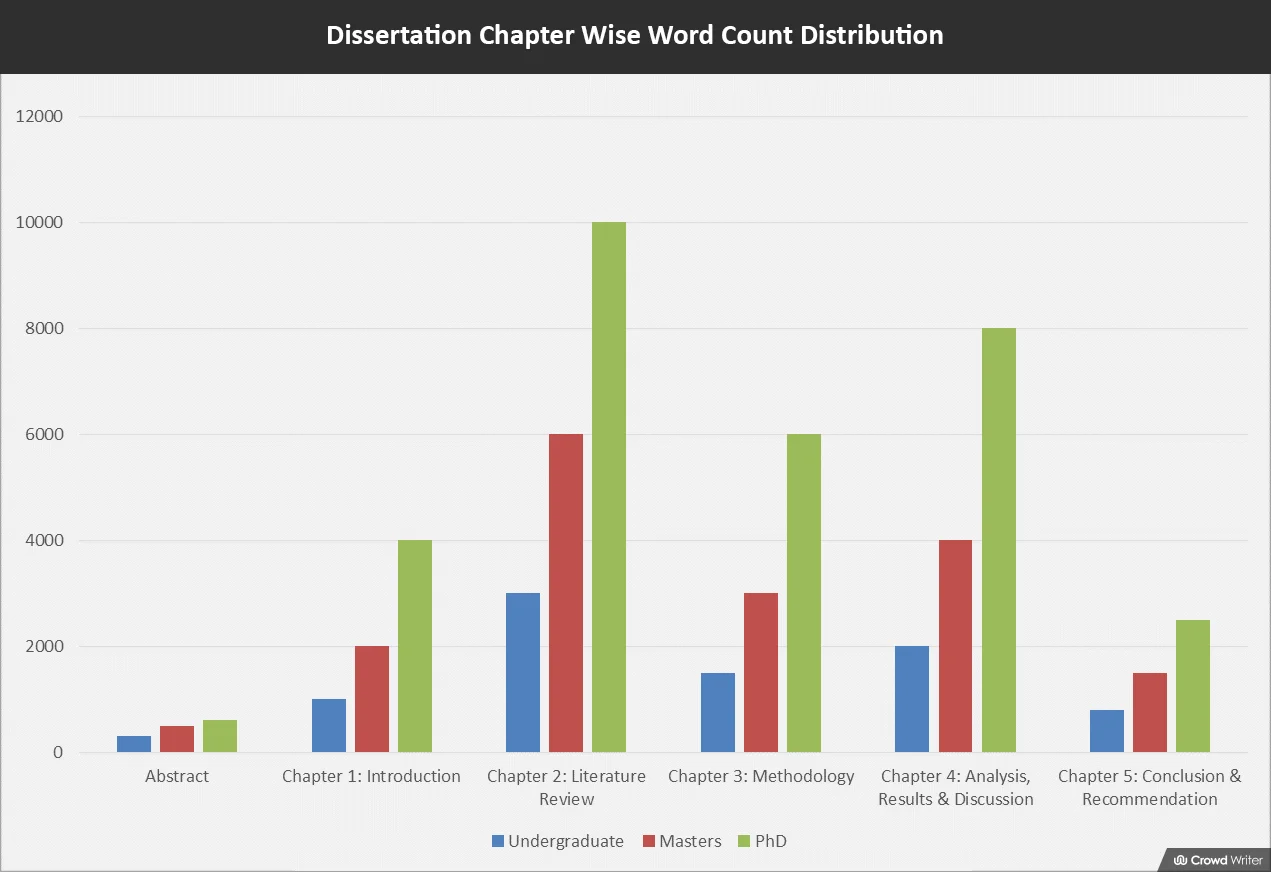How Long Is A Dissertation: Chapter-To-Chapter Division
By Laura Brown on 10th July 2023
Students often worry about how many words is a dissertation. The length of a dissertation can vary depending on the field of study, the institution, and the level of education.
- Undergraduate dissertations are typically between 8,000 to 12,000 words
- Master’s dissertations are normally between 15,000 to 25,000 words.
- Whereas, PhD dissertations or theses are typically book-length, at 30,000 to 100,000 words.
However, these are just general guidelines, and your dissertation may be shorter or longer depending on specific requirements of your professor or institution.
So, if you are reading this, it is for sure you are looking forward to determining the right length of the dissertation. We welcome all the aspiring scholars to Crowd Writer UK as today, we embark on an exciting journey into the world of dissertations.
For many of you, the term “dissertation” might still be shrouded in mystery. Fear not, we are here to shed light on this significant milestone in your academic career. So, grab a seat, and let’s unravel the secrets of dissertation length!
What is a Dissertation
First things first, before knowing how many words is a dissertation, we need to understand what exactly is a dissertation? Well, think of it as the pinnacle of your academic pursuit. A dissertation is an in-depth research project that demonstrates your mastery of a particular subject or field. It showcases your ability to critically analyse existing knowledge, conduct original research, and contribute to scholarly conversation.
Length Matters, But Don’t Panic!
Now, let’s address the burning question: How long is a dissertation UK? The answer may vary depending on your academic level. For undergraduate students, the average length typically ranges from 8,000 to 12,000 words. As you progress to the masters level, the length expands to around 15,000 to 25,000 words. Finally, for those aiming for the coveted PhD degree, the dissertation can extend further, ranging from 60,000 to 100,000 words or more.
But hold on! Before you start panicking about the sheer number of words, remember that quality triumphs over quantity. The goal of a dissertation is not simply to reach a specific word count, but rather to demonstrate your expertise and contribute to the knowledge base of your field.
Why Length Varies
The variation in dissertation length across academic levels is influenced by several factors. Undergraduates often exploring their research skills for the first time, while masters students delve deeper into their chosen discipline. PhD candidates are expected to produce extensive original research, making their dissertations more comprehensive.
Keep in mind that these length ranges are not set in stone. Your university or department might have specific guidelines, so it’s essential to familiarise yourself with their requirements. Additionally, the nature of your research topic and the expectations of your advisor will influence the final length.
Embrace the Journey On How Long Is A Dissertation
As you embark on your dissertation adventure, remember that it’s not just about meeting a word count. Your dissertation is an opportunity to delve into a subject you are passionate about, contribute new insights, and make your mark in the academic world. Stay focused, manage your time wisely, and seek guidance from your mentors.
So, dear students, fear not the length of your dissertation. Instead, channel your energy into producing a well-crafted, impactful piece of research. Now that we’ve set the stage, let’s dive into the chapters that make up a dissertation and explore their respective lengths.
Get ready to unleash your academic prowess!
Abstract: Unveiling the Essence of Your Dissertation
An abstract is a concise summary that captures the essence of your entire dissertation. It serves as a preview, enticing readers to delve deeper into your research. Think of it as a miniaturised version of your dissertation, highlighting the key aspects and findings in a condensed format.
Undergraduate
For undergraduate dissertations, abstracts are typically around 150 to 300 words. This limited word count requires a focused approach, emphasising the main research objective, methodology, and significant results.
Masters
As you move to the master’s level, abstracts expand to around 200 to 500 words. This allows for a more detailed overview of the research problem, methodology, findings, and conclusions.
PhD
At the PhD level, abstracts become more comprehensive, ranging from 300 to 600 words or more. These abstracts often include additional elements such as theoretical frameworks, research contributions, and future implications.
The purpose of an abstract is to provide a succinct snapshot of your research, enticing readers to explore further. So, craft your abstract carefully, ensuring it captures the essence of your dissertation and enthrals your audience.
Now that we’ve uncovered the significance and lengths of abstracts, let’s delve into the chapters that form the backbone of your dissertation.
Chapter 1: Introduction: Paving the Path for Your Research
The introduction serves as a roadmap for your dissertation, captivating readers and guiding them through your research journey. There is no need to worry about how to write a dissertation introduction, as we have got you covered on this. Tailor your introduction to your academic level, demonstrating a clear understanding of the subject matter and setting the foundation for your subsequent chapters.
Undergraduate
For undergraduate dissertations, the introduction typically ranges from 500 to 1,000 words. In this concise yet informative section, you’ll present the research problem, provide background information, and clearly state your research objectives.
Masters
If you are at a master’s level, the introduction expands to approximately 1,000 to 2,000 words. This allows for a more comprehensive exploration of the research topic, including a review of relevant literature and the identification of research gaps.
PhD
For PhD dissertations, the introduction further expands, ranging from 2,000 to 4,000 words. This extensive section encompasses a thorough literature review, establishing the theoretical framework, and outlining the research questions with detailed justifications.
Chapter 2: Literature Review: Building on the Foundations of Knowledge
The Literature Review chapter is a critical component of your dissertation, showcasing your understanding of existing research and theoretical frameworks. It showcases your ability to synthesise and analyse existing knowledge, positioning your research within the broader scholarly conversation. Let’s have a look at
Undergraduate
For undergraduate dissertations, the literature review typically spans around 1,500 to 3,000 words. This section focuses on introducing key concepts, providing an overview of relevant studies, and identifying gaps in the existing literature.
Masters
At the master’s level, the literature review expands to approximately 3,000 to 6,000 words. Here, you’re expected to demonstrate a deeper understanding of the subject, critically analyse existing research, and highlight the theoretical frameworks that inform your study.
PhD
For PhD students, the literature review goes further, ranging from 6,000 to 10,000 words or more. This extensive section involves an in-depth exploration of scholarly work, demonstrating your expertise in the field and presenting a comprehensive overview of the research landscape.
Chapter 3: Methodology: Unveiling Your Research Approach
The Methodology chapter outlines the research design, data collection methods, and analytical techniques employed in your dissertation. It demonstrates your ability to conduct rigorous research and ensures the validity and reliability of your findings. Here is the description of the length of the most significant methodology chapter on the basis of your academic level.
Undergraduate
For undergraduate dissertations or theses, the Methodology section typically spans around 800 to 1,500 words. Well, there is no need to be confused between dissertation or thesis, you can easily understand the difference between thesis and dissertation in no time. Well, in this section of the dissertation, you’ll provide an overview of your research design, including details on data collection methods and basic statistical analyses.
Masters
If you are wondering how many words is a masters dissertation methodology chapter, we have got you covered. It is about 1,500 to 3,000 words. This allows for a more detailed description of your research approach, including the rationale behind your chosen methods and a discussion of any ethical considerations.
PhD
The Methodology chapter is from 3,000 to 6,000 words or more. This comprehensive section entails a thorough explanation of your research design, data collection procedures, sampling strategies, and advanced analytical techniques.
Chapter 4: Analysis, Results & Discussion: Unveiling the Insights
As we carry on to understand how many words in a dissertation. The next chapter inline is the Analysis, Results & Discussion chapter where you have the opportunity to present and interpret the findings of your research. The length of this chapter can vary depending on the complexity of your study and the depth of analysis required.
Undergraduate
The Analysis, Results & Discussion section goes around 1,000 to 2,000 words. As you go on to understand how long is a dissertation UK, here, you will present the key findings of your research, supported by relevant data and analysis. Engage in a critical discussion of these results, relating them back to your research questions and objectives.
Masters
At the master’s level, the Analysis, Results & Discussion chapter expands to approximately 2,000 to 4,000 words. Showcase a more detailed and in-depth analysis of your findings, employing advanced analytical techniques as appropriate. Discuss the implications of your results, considering their significance within the broader context of the field.
PhD
The Analysis, Results & Discussion chapter further expands, ranging from 4,000 to 8,000 words or more. Conduct a comprehensive analysis of your findings, providing a meticulous examination of the data. Engage in a rigorous discussion, critically evaluating the implications and contributions of your research to the field.
Chapter 5: Conclusion & Recommendation: Bridging the Gap and Charting New Paths
In the concluding chapter of your dissertation, you have the opportunity to tie together the threads of your research journey and provide valuable insights for future exploration. The length of the Conclusion & Recommendation chapter varies across academic levels, offering a platform to summarise your findings and propose meaningful recommendations.
Undergraduate
For undergraduate dissertations, the Conclusion & Recommendation section typically encompasses around 500 to 800 words. Here, you concisely summarise the key findings of your study, highlighting their significance and relevance. Offer practical recommendations that emerge from your research, suggesting avenues for further investigation.
Masters
If you are willing to know how long is a masters dissertation when it comes to the Conclusion & Recommendation chapter. It goes to approximately 800 to 1,500 words. Here, you should reflect on the broader implications of your research, considering its impact on the field. Provide comprehensive recommendations that build upon your findings, guiding future research and applications.
PhD
The Conclusion & Recommendation chapter further increases, ranging from 1,500 to 2,500 words or more. In this chapter, you have to synthesise the extensive body of work you have conducted, emphasising its contributions to the field. Further, offer novel insights and recommendations, challenging existing paradigms and paving the way for future research breakthroughs. If you feel like it is still a challenging task for you, buy dissertation online with Crowd Writer and we will do it for you satisfactorily.
While Summing Up On How Long Is A Dissertation UK…
How long should a dissertation be? This is the first and foremost question students ask when they are up to writing it. Different chapters of the dissertation reflect different word counts on the basis of your academic level, i.e. undergraduate, masters, and PhD levels.
The blog post contains a chapter-to-chapter division of the word count for different academic levels. By understanding these chapter lengths, students can better navigate the dissertation writing process and create impactful research contributions within their academic journey.

